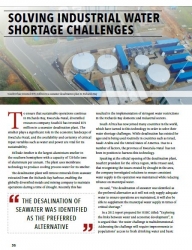Solving Industrial Water Shortage Challenges - Pivot2017-06-09 To ensure that sustainable operations continue in Richards Bay, KwaZulu-Natal, diversified resources company South32 has invested R74 million in a seawater desalination plant. The smelter plays a significant role in the economic landscape of
KwaZulu-Natal, and the availability and certainty of critical input variables such as water and power are vital for its sustainability. Hillside Smelter is the largest aluminium smelter in the southern hemisphere with a capacity of 720 kilo tons of aluminium per annum. The plant uses membrane technology to produce cooling process water for its smelter. The desalination plant will remove minerals from seawater extracted from the Richards Bay harbour, enabling the globally diversified metals and mining company to maintain operations during a time of drought. Recently this has resulted in the implementation of stringent water restrictions in the Richards Bay domestic and industrial sectors. South Africa has now joined many countries in the world, which have turned to this technology in order to solve their water shortage challenges. While desalination has existed for ages and is being used routinely in countries such as Israel, Saudi Arabia and the United States of America. Due to a number of factors, the province of KwaZulu-Natal has not been in position to harness this technology. Speaking at the official opening of the desalination plant, South32 president for the Africa region, Mike Fraser said, that recognising the issues created by drought in the area, the company investigated solutions to ensure consistent water supply to the operation was maintained while reducing reliance on municipal water. He said, “The desalination of seawater was identified as the preferred alternative as it will not only supply adequate water to ensure operations are maintained, it will also be able to supplement the municipal water supply in times of critical shortage.†In a 2012 report prepared for HSBC titled: “Exploring the links between water and economic developmentâ€, it is argued that: The water challenge is multidimensional. Addressing the challenge will require improvements to populations’ access to fresh drinking water and basic sanitation service…it will require improvements in the way we manage available fresh water resources in river basins; how efficiently and effectively we use fresh water resources in agriculture, industry and household use…how we finance investments required to improve water productivity; the interdependencies between water, food, energy and climate change…†The KwaZulu-Natal Government welcomes the initiative taken by South32 to install a desalination plant that will bolster our efforts to seek alternative sources of water supply that include the acquisition and activation of technologies that could assist in the renewal and preservation of potable water. This investment in the scientific and engineering innovation will go a long way in inspiring more similar projects to save the province and country from the water shortages that threaten all living organisms and industrial growth. The innovation shown by South32 to obtain and secure an alternative source of water indicates the role that can be played by the private sector to diversify our water streams by investing in alternative sources of water such as this. This investment is not only an enabler but will ensure that South32 is able to discharge its responsibility without being worried about the constant supply of water. Fraser said that the desalination plant was an example of how sound relationships and the right partnerships resulted in a project that addressed the water issues and added value to the region. Mr Sihle Zikalala, MEC for Economic Development, Tourism and Environmental Affairs commented, “We are optimistic that this desalination project would not be the last initiative featuring government and the private sector as we have a common responsibility of addressing the country and province’s developmental challenges, including the creation of employment opportunities and transformation of our economy to include the historically excluded communities. This is critical for the achievement of a stable democracy that attracts more investments to add value to our developmental agenda.†“In conclusion, the future of this project will hinge on business embracing the country’s laws that include correct and legal utilisation of the natural resources to ensure the protection of our environment. This implies that the desalination process should be conducted in a manner that doesn’t endanger the marine species through the harvesting and processing of the sea water to augment our depleted fresh water system. We can learn from other nations that have perfected the art of desalination as to how they were able to balance the environmental consideration with the process of extricating potable water from the ocean,†said Mr Zikalala. |
Solving Industrial Water Shortage Challenges - Pivot
Copyright © 2024 KwaZulu-Natal Top Business
